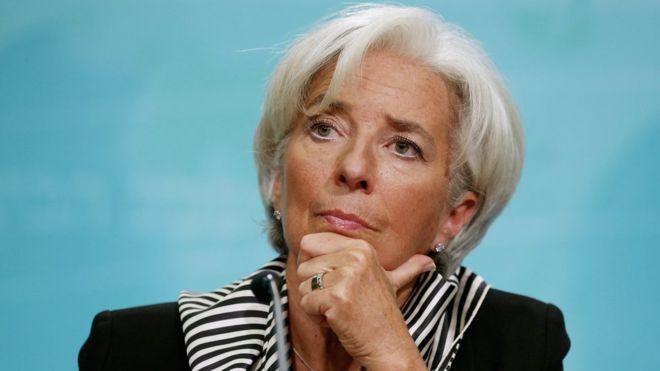Mozambique: IMF, austerity and inequality

As the IMF discusses a new programme with Mozambique, an important debate with and within the IMF becomes relevant. After the secret debt fiasco, the IMF has the upper hand, but donors and civil society will need to monitor the discussions to ensure that a hard-nosed IMF negotiating team actually follows the new guidelines emerging from Washington.
For four years, IMF head Christine Lagarde has taken a lead in stressing that inequality reduces economic growth, most recently speaking at Davos in January. This triggered articles such as "The IMF is showing some hypocrisy on inequality" by Christopher Sheil and Frank Stilwell, who argue that "IMF leaders should practise what they preach when it comes to inequality." One response is an IMF blog by Prakash Loungani and Jonathan D. Ostry, entitled appropriately "Bridging Research and Reality".
Mozambique's new programme will be one of the first since Christine Lagarde's most recent Davos speech. Three factors will come into play. First the IMF will demand increased austerity. Second the IMF will want to at least slap the wrists of Mozambique for being a bad child by keeping the $2 bn debt secret. But, third, inequality in Mozambique doubled in the past six years, and a year ago the then IMF resident representative Alex Segura-Ubiergo warned that "high levels of inequality hamper government policies to reduce poverty", "make it difficult to sustain growth", and "can lead to political instability". This is confirmed in another new IMF study, by Stefania Fabrizio and others.
In a 16 February statement, the IMF says "increasing the income share of the poorest can boost growth, but raising the income share of the richest can actually harm growth." But Shell and Stilwell argue that IMF operational guidelines for its annual macroeconomic surveys make no reference to inequality, "nor has anything significant changed in the requirements that the IMF imposes on countries to which it provides financial assistance."
The IMF's Loungani and Ostry note that IMF programmes tend to focus on three policy areas: reducing budget deficits through austerity, liberalizing labour markets, and removing barriers to the movement of capital across borders. But they note that these policies "sometimes have the side effect of raising inequality". To counter this, they stress the need to protect public spending on health and education, and to encourage redistribution through cash transfers to low-income families and other welfare benefits. They also note that "spending on infrastructure reduces inequality." Fabrizio and his team point out that infrastructure investment efficiency matters, and they use the World Economic Forum (WEF) measure of "wastefulness of government spending". And WEF finds that for Mozambique, although corruption is a problem, government spending is relatively efficient.
Agriculture remains a key issue. Farm subsidies (always opposed by donors and the IMF) actually increase the incomes of workers, reducing inequality, Fabrizio et al look specifically at Malawi's fertilizer subsidy, and found that it both boosted maize production, raised the income of small and poor farmers, and reduced poverty and inequality. Cash transfers to the rural poor are an alternative to farm subsidies.
Fabrizio et al argue there is a need to boost agricultural productivity, but they warn that in the short term this tends to only benefit the better off, increasing inequality, so it should be combined with cash transfers to the rural poor. In addition that call for investment in rural electrification and irrigation, more investment in agricultural R&D and services, and increased access to financial services.
All this requires increased spending and goes counter to austerity. The IMF forced Mozambique to adopt the Value Added Tax (a sales tax) but Loungani and Ostry point out that greater reliance on indirect taxes like VAT increase inequality. The Fabrizio team notes that "VAT rate increases adopted by LIDCs [low income developing countries] over the past two decades have been associated with higher inequality."
Financial sector reforms are sure to be part of any IMF programme for Mozambique, but the Fabrizio team point out that "financial sector reforms can exacerbate inequality if financial access is limited to a small share of the population" - which is the case in Mozambique.
Donors will play a key role because they have effectively made a return to a normal aid programme conditional on a new IMF programme. Donors have put the IMF in charge, but will need to keep tabs on the negotiations, to ensure that in Mozambique the IMF really does "walk the talk" and does not impose an austerity package that further increases inequality.
* Joseph Hanlon edits and distributes a newsletter on Mozambique.
Further reading
IMF, Stefania Fabrizio et al, 26 January 2017, "Macro-Structural Policies and Income Inequality in Low-Income Developing Countries" https://www.imf.org/en/Publications/Staff-Discussion-Notes/Issues/2017/01/26/Macro-Structural-Policies-and-Income-Inequality-in-Low-Income-Developing-Countries-44526
Christopher Sheil and Frank Stilwell, 13 Feb 2017, "The IMF is showing some hypocrisy on inequality" https://theconversation.com/the-imf-is-showing-some-hypocrisy-on-inequality-72497
IMF 16 Feb 2017 "Response to Article: 'The IMF is Showing Some Hypocrisy on Inequality'” http://www.imf.org/en/news/articles/2017/02/16/vc02162016-response-to-article-the-imf-is-showing-some-hypocrisy-on-inequality
IMF, Prakash Loungani and Jonathan D. Ostry, 22 Feb 2017, "The IMF’s Work on Inequality: Bridging Research and Reality" https://blog-imfdirect.imf.org/2017/02/22/the-imfs-work-on-inequality-bridging-research-and-reality/ - more-16886
On Mozambique inequality, this newsletter 306 and 308, 4 and 16 January 2016.
World Economic Forum, 27 Sep 2016, "The Global Competitiveness Report 2016-2017" http://www3.weforum.org/docs/GCR2016-2017/05FullReport/TheGlobalCompetitivenessReport2016-2017_FINAL.pdf (Mozambique ranks 133 out of 138 countries on global competitiveness, but on key issues it ranks much better - wastefulness of government spending (91), burden of government regulation (90), and strength of investor protection (86))

